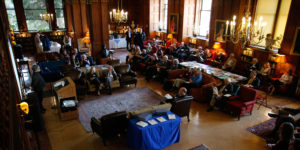Every year as the semester comes to a close, the Oral History Center hosts a very special event. We call the event our annual Commencement celebrating the Oral History Class of that year. We invite campus friends, project partners, and everyone (and their families and friends) whose oral history we completed in the previous year. Every year this has been a joyous and often moving event. Every normal year, I should say, as we were unable to gather our community together this year. So, like almost every other social gathering, we’ve decided to host our commencement virtually by devoting and dedicating this newsletter to the Oral History Class of 2020. In articles within, you’ll be treated to thoughtful reviews by our interviewers on the past year’s oral histories. We’re also including a feature on a podcast produced by undergraduate Miranda Jiang, which was originally planned to be a live performance at the event. And we’re announcing Ricky Noel as the first winner for the Carmel and Howard Friesen Prize in Undergraduate Oral History Research, which we had hoped to award at the commencement.

This year I’ve also decided to hand over the honor — and the duty — of the commencement address to my very able colleagues at the Oral History Center. Several of the Center’s interviewers have written about their interviews from the previous year, offering well-considered thoughts on what they learned and on what valuable lessons might be drawn from those voices now preserved in our archive. These four “commencement addresses” are worth reading on their own, but taken together they offer a compelling answer to the question: why is oral history unique, or perhaps better, what can oral history uniquely teach me?
Amanda Tewes focuses on her several interviews for the Getty Trust Oral History Project and reveals that conducting interviews — and setting the framework for conducting successful ones — has taught her a great deal about humility, and how humility takes work and planning. Roger Eardley-Pryor contributed a thoughtful piece showing how oral histories uniquely show how expertise is rarely a solitary achievement but one that is possible because of mentorship, collaboration, and even rivalry. Shanna Farrell centers her many interviews for the East Bay Regional Park District project and highlights the many diverse people who need to work together to make something that we too often take for granted — in this case, open space and parklands. Finally, Paul Burnett reflects on the moments in interviews when narrators revealed a failing — personally or institutionally — and struggled with how to respond and how to accept responsibility. I think each of these “commencement addresses” demonstrate not only the breadth and depth of OHC’s collections but also, and equally importantly, that contained within these interviews are innumerable lessons learned and now shared over the narrators’ collective hundreds (or thousands) of years of experience. They show that we are capable of making mistakes but also correcting them, that we change as we grow and often strive to do better. I am thankful for these contributions by my amazing colleagues, as well as for a culture of open dialog that allows people to acknowledge past difficulties without sanction as they themselves pursue a better path forward.
Martin Meeker, Charles B. Faulhaber Oral History Center